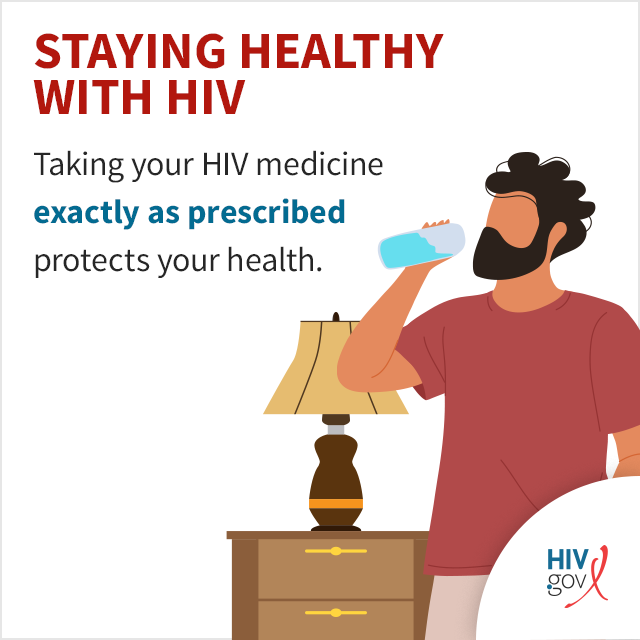Taking Your HIV Medicine as Prescribed

Why Should You Take Your HIV Medicine as Prescribed?
If taken as prescribed, HIV medicine can reduce the amount of HIV in your blood (also called your viral load) to a very low level. This is called viral suppression.
If your viral load is so low that a standard lab can’t detect it, this is called having an undetectable viral load. People with HIV who take HIV medicine as prescribed and get and keep an undetectable viral load can live long and healthy lives and will not transmit HIV to their HIV-negative partners through sex.
HIV treatment involves taking highly effective medicines called antiretroviral therapy (ART) that work to control the virus. ART is recommended for everyone with HIV, and people with HIV should start ART as soon as possible after diagnosis, even on that same day.
People on ART take a combination of HIV medicines called an HIV treatment regimen. There are two types of HIV treatment: pills and shots. Pills are recommended for people who are just starting HIV treatment. There are several FDA-approved combinations of HIV medicines that are available in a single pill.
People who have had an undetectable viral load (or have been virally suppressed) for at least three months may consider shots.
Taking HIV Treatment Shots
HIV treatment shots are long-acting injections used to treat people with HIV. The shots are given by your health care provider and require routine office visits. HIV treatment shots are given once a month or once every other month, depending on your treatment plan. Talk to your provider about whether shots are right for you.
Is It OK to Skip a Dose?
When you take HIV medicine in pill form, it’s important to take it every day, exactly as prescribed.
That’s important because skipping doses makes it easier for HIV to change form, causing your medication to stop working. This is called drug resistance. HIV can become resistant to your medication and to similar medications that you have not yet taken. This limits your options for successful HIV treatment. Drug-resistant strains of HIV can be transmitted to others, too.
Taking your HIV medicine every day, exactly the way your health care provider tells you to, will help keep your viral load low and your CD4 cell count (a count of white blood cells that fight infection) high. If you skip doses, even now and then, you give HIV the chance to multiply rapidly. This could weaken your immune system, and you could become sick.
Talk to your health care provider if you miss a dose. In most cases, if you realize you missed a dose, take the medicines as soon as you can, then take the next dose at your usual scheduled time (unless your pharmacist or health care provider has told you something different).
If you find you miss a lot of doses, talk to your health care provider or pharmacist about ways to help you remember to take your medicines as prescribed. You and your health care provider may even decide to change your treatment regimen to fit your health care needs and life situation, which may change over time.
When your HIV treatment is in injectable form, it is also very important follow the dosing schedule your doctor provides. Setting a consistent injection date can help you stay on track.
Get tips on taking your HIV medicine as prescribed.
Do You Have to Take Your HIV Medicine If Your Viral Load Is Undetectable?
Yes. ART is not a cure and the virus remains in your body, even if your viral load is undetectable. So you need to keep taking your HIV medicine as prescribed. If you stop taking your HIV medicine, your viral load will quickly go back up.
If you have stopped taking your HIV medicine, talk to your health care provider as soon as possible. Your provider can help you address issues that may have caused you to stop taking your medication, such as side effects or cost and help you get back on track. Together, you can discuss the best strategies to prevent transmitting HIV to your sexual partners until your viral load is confirmed to be undetectable again.
